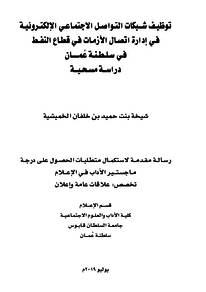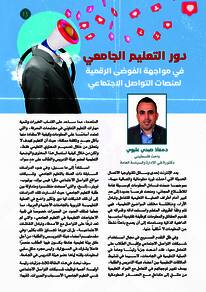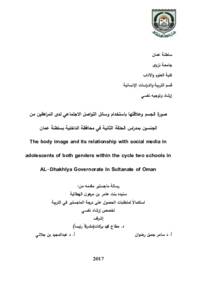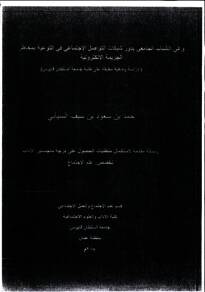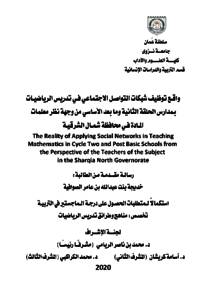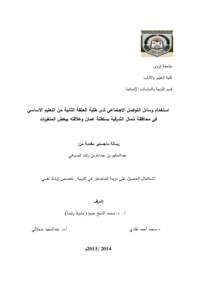Document
توظيف شبكات التواصل الاجتماعي الإلكترونية في إدارة اتصال الأزمات في قطاع النفط في سلطنة عمان: دراسة مسحية.
Publisher
جامعة السلطان قابوس
Gregorian
2019
Language
Arabic
Subject
English abstract
The study aims at investigating the extent of using electronic social networks (Facebook, Twitter and Instagram) in managing corporate crisis communication in the Sultanate of Oman; by investigating a number of crises faced by the oil sector during the last five years; via analyzing the posts and tweets of the accounts of the Ministry of Commerce and Industry, the Ministry of Oil and Gas and the Ministry of Manpower during these crises; which are respectively: the crisis of fuel 95, the crisis of high oil prices, and the crisis of the layoffs of oil companies; in addition to analyzing the hashtags launched by the public via these networks then studying the opportunities offered by these networks to enhance the ministries' communication with the public, especially during times of crisis.
The study relied on the survey methodology using the content analysis tool during the period from 10 December 2018 to 10 March 2019 for a total of 89 posts, 38 hashtags and 28103 comments. The study also interviewed admins of the social networks in the three above mentioned ministries, where 6 admins were interviewed, two from each ministry.
The study found out that the ministries still do not benefit from the interactive advantages offered by these networks. They still use one way communication related to crises discussed through these networks, although they provide a good opportunity to communicate with the public directly. All ministries neither responded to the public's comments on their posts nor on the hashtags that were launched concerning the crises under study. Instead, ministries only disseminated their crisis-oriented messages, which were brief and did not contain sufficient and clear information about the crises in hand. The analysis revealed the silence of the ministries and the lack of sufficient information and facts on the crises, which led the public to launch hashtags in order to produce and disseminate information from their personal accounts.
The results also indicated that the employment of electronic social networks in managing crisis communication faced by these ministries are similar in all the different networks, all treated as a single network, and findings stressed that "Twitter" included more intensive discussions during crises, either through the ministries' posts or the comments and hashtags of the public.
Moreover, results of the interviews showed that these ministries do not own a unified strategy for crisis communication management via their social networks and that every crisis is dealt with simultaneously. Furthermore, there are no specialized staff to manage the content of the social networks besides that the needed information regarding the crisis cannot be published before taking a permission from the higher administration of the ministries. The negative impressions and constant criticism of the public led these ministries to keep silent in responding to the comments on social networks.
Finally, the study recommends that the Omani government corporations need to develop a deliberate and written strategy to manage corporate communication during crisis through social networks, since these channels are important in offering direct and prompt communication with the public especially during times of crisis. The study also recommends that Omani corporations should establish specialized departments for social media management and employ qualified staff to benefit from utilizing social networks. In addition, timely surveys should be conducted targeting the public following these accounts in order to determine the most appropriate communication methods for them, in terms of language and the tone of the posts and to identify their attitude especially during the time of crisis.
Member of
Resource URL
Arabic abstract
هدفت الدراسة إلى بحث مدى توظيف شبكات التواصل الاجتماعي الإلكترونية (فيسبوك وتويتر وانستغرام) في إدارة اتصال الأزمات في قطاع النفط في سلطنة مان بالتطبيق على عينة من الأزمات التي تعرض لها قطاع النفط في السلطنة خلال الأعوام الخمسة المنصرمة، من خلال تحليل منشورات حسابات وزارة التجارة والصناعة، ووزارة النفط والغاز، ووزارة القوى العاملة، أثناء تعرضها للأزمات محل الدراسة وهي على التوالي: أزمة وقود ۹۵، وأزمة ارتفاع أسعار الوقود، وأزمة تسريح العاملين من الشركات النفطية، بالإضافة إلى تحليل الوسوم التي أطلقها الجمهور حول هذه الأزمات على هذه الشبكات وتحليل استفادة هذه الوزارات من المميزات التي تطرحها تلك الشبكات في تعزيز اتصالها مع الجمهور وخاصة وقت الأزمات، واعتمدت الدراسة على منهج المسح الإعلامي باستخدام أداة تحليل المضمون خلال الفترة من 10 ديسمبر۲۰۱۸ إلى ۱۰ مارس ۲۰۱۹ لمجموع (۸۹) منشورا، و(۲۸) وسما، بمجموع تعليقات بلغ (۲۸۱۰۳) تعليقات، كما اعتمدت الدراسة على أداة المقابلة مع القائمين على إدارة شبكات التواصل الأجتماعي الإلكترونية في المؤسسات الثلاث، حيث تمت مقابلة 6 مبحوثين بواقع مبحوثين في كل وزارة وتوصلت الدراسة إلى أن المؤسسات لم تستفد حتى الآن من ميزة التفاعلية التي تتيحها هذه الشبكات فهي لا تزال تستخدم الاتصال أحادي الاتجاه فيما يخص الأزمات المطروحة على هذه الشبكات، على الرغم من أن لديها فرصة جيدة للتواصل مع الجمهور بشكل مباشر، فجميع المؤسسات التي خضعت لهذه الدراسة لم ترد على تعليقات الجمهور سواء على منشوراتها أو على الوسوم التي أطلقت وتتعلق بالأزمات المحددة، وإنما اكتفت بنشر رسائلها المعدة عن الأزمة والتي تتميز بأنها مقتضبة ولا تحمل معلومات كافية وواضحة عن الأزمة، حيث كشف التحليل صمت المؤسسات وعدم تقديم معلومات كافية وحقائق واضحة بشأن الأزمات التي تعرضت لها، لذلك توجه الجمهور لإطلاق الوسوم وإنتاج المعلومات، وتوجيهها من حساباتهم الخاصة
وأشارت النتائج أيضا إلى أن توظيف شبكات التواصل الاجتماعي الإلكترونية في إدارة اتصال الأزمات التي تعرضت لها هذه المؤسسات، متشابه على جميع الشبكات، ويتم التعامل معها على أنها شبكة واحدة ، كما تبين أن «تويتر» هي الشبكة التي حققت مناقشات بشكل مكثف خلال الأزمات سواء من خلال منشورات المؤسسة، أو وسوم وتعليقات الجمهور وأوضحت نتائج المقابلات، أنه لا توجد استراتيجية موحدة لإدارة اتصال الأزمات عبر شبكات التواصل الاجتماعي لدى هذه المؤسسات، وإنما يتم التعامل بشكل آني مع كل أزمة، كما أنه لا يوجد موظفون متخصصون لإدارة محتوى شبكات التواصل الاجتماعي، ولا يتم نشر ما يتعلق بالأزمات إلا بعد الرجوع القرارات الإدارة العليا المؤسسة، وتتسبب النظرة السلبية والنقد الدائم من الجمهور، في اتباع المؤسسات سياسة الصمت في الرد على تعليقات المتابعين عبر هذه الشبكات وأخيرا توصي الدراسة بضرورة قيام المؤسسات الحكومية في سلطنة عمان بوضع استراتيجية مدروسة ومكتوبة الإدارة اتصال الأزمات عبر شبكات التواصل الاجتماعي الإلكترونية، لأهمية هذه القنوات و التواصل المباشر والسريع مع الجمهور، وخاصة أثناء الأزمات، كما توصي الدراسة أيضا باستحداث أقسام متخصصة بالإعلام الإلكتروني ورفدها بالكوادر المتخصصة والمؤهلة التي تستفيد من كافة المميزات التي تطرحها هذه الشيكات، كما توصي الدراسة بضرورة عمل المسوحات الدورية للجمهور المتابع لهذه الحسابات حتى يتم تحديد طريقة الاتصال الأنسب مع كافة شرائحه من حيث اللغة ونبرة المنشورات ومعرفة توجهاتهم وخاصة أوقات الأزمات.
وأشارت النتائج أيضا إلى أن توظيف شبكات التواصل الاجتماعي الإلكترونية في إدارة اتصال الأزمات التي تعرضت لها هذه المؤسسات، متشابه على جميع الشبكات، ويتم التعامل معها على أنها شبكة واحدة ، كما تبين أن «تويتر» هي الشبكة التي حققت مناقشات بشكل مكثف خلال الأزمات سواء من خلال منشورات المؤسسة، أو وسوم وتعليقات الجمهور وأوضحت نتائج المقابلات، أنه لا توجد استراتيجية موحدة لإدارة اتصال الأزمات عبر شبكات التواصل الاجتماعي لدى هذه المؤسسات، وإنما يتم التعامل بشكل آني مع كل أزمة، كما أنه لا يوجد موظفون متخصصون لإدارة محتوى شبكات التواصل الاجتماعي، ولا يتم نشر ما يتعلق بالأزمات إلا بعد الرجوع القرارات الإدارة العليا المؤسسة، وتتسبب النظرة السلبية والنقد الدائم من الجمهور، في اتباع المؤسسات سياسة الصمت في الرد على تعليقات المتابعين عبر هذه الشبكات وأخيرا توصي الدراسة بضرورة قيام المؤسسات الحكومية في سلطنة عمان بوضع استراتيجية مدروسة ومكتوبة الإدارة اتصال الأزمات عبر شبكات التواصل الاجتماعي الإلكترونية، لأهمية هذه القنوات و التواصل المباشر والسريع مع الجمهور، وخاصة أثناء الأزمات، كما توصي الدراسة أيضا باستحداث أقسام متخصصة بالإعلام الإلكتروني ورفدها بالكوادر المتخصصة والمؤهلة التي تستفيد من كافة المميزات التي تطرحها هذه الشيكات، كما توصي الدراسة بضرورة عمل المسوحات الدورية للجمهور المتابع لهذه الحسابات حتى يتم تحديد طريقة الاتصال الأنسب مع كافة شرائحه من حيث اللغة ونبرة المنشورات ومعرفة توجهاتهم وخاصة أوقات الأزمات.
Category
Theses and Dissertations

